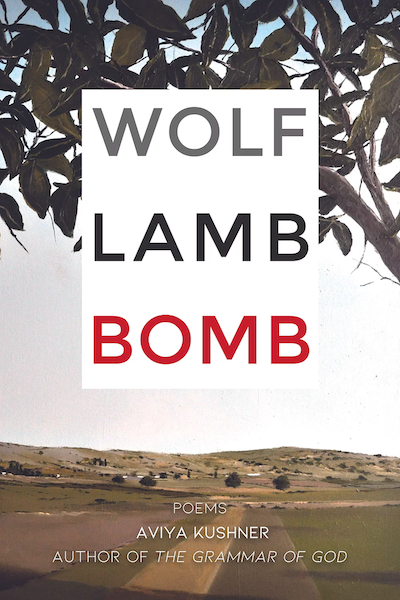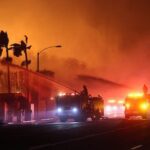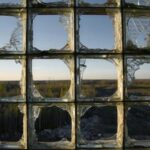Wolf Lamb Bomb
By: Aviya Kushner
Published: June 1, 2021 (Orison Books)
Wolf Lamb Bomb, by Aviya Kushner, reminds me of my Jewish friend’s warning to her young daughter: “Remember, no matter where you are, you are never safe.” This dread runs like an emotional third rail through the heart of this masterful first book of poems. Kushner grew up speaking Hebrew in an Orthodox family in Monsey, New York and her engagement with The Book of Isaiah in Wolf Lamb Bomb is fierce, fueled by obsession with prophecy and the horrors of history. While the book does not focus on the Holocaust or the Israeli-Palestinian conflict per se, these tragedies shadow its obsessions, which are collective and individual destiny and a mythical enemy, the ever-present Assyria, who “never dies, just returns in disguise.” Is there an end to genocide, exile, and war? What do you tell your children? Would you want Isaiah to do the explaining? Kushner’s text wants to know how to live with an ancient, ever-present menace and whether Jewish history must always be formulated this way.
Kushner’s intimacy with The Book of Isaiah is the key element of her collection. She seems to know the text as well as she does the sound of her own breathing, and her deep love of the verses permeates her dismay and her wish to evade their claim on her. In Wolf Lamb Bomb, she encounters the prophet in many forms: in a traumatized stranger she meets in Iowa, in an old man who desires her, in a Jerusalem bombing she witnesses, where the attack brings a terrible self-recognition:
An old woman wailing, insane at the end
Wild in her anger at God, at the holy city.
Her poems take on the prophecies—the cycle of fury, witness, solace—and become a form of prophecy themselves, messing with the registers we expect of biblical utterance:
I’m gonna thank you one day because you got angry
At me. I’m gonna crawl back now
Or:
Oh man, let me be—
I want to weep, I want to take
my high-heeled sandals off and walk
in the desert
Kushner often wonders about the poetics of prophecy, how we distinguish a prophet from a “crooner” on a stage, placing herself in “the light of an audience, the light of the world.” Carnality, atrocity, and song intermingle throughout what she and Isaiah share:
Was the night of pleasure you sing
about the one of darkness and explosions,
of bodies incinerated to bits, to heads
and rolling parts, the most public
of humiliations, the quivering dead tongues
Here and elsewhere, as in Isaiah, the prophetic cycle repeats at an often dizzying speed, a whirlwind where God’s love, the horror of His fury, and His redemption are as good as simultaneous.
Sometimes the pace slows down. In New York after 9/11, Kushner reminds us of an exquisite aftermath:
how quiet it was on the highways,
how drivers let other pass,
how even the Hudson seemed to mourn,
and how we began to be thankful […]
and how the smoke was followed
by a mild winter,
and how everything seems more
beautiful, I suppose,
and temporary after the sword, after the worst.
But like Isaiah’s, the solace Kushner evokes only follows from the horror that proceeds it. Like Isaiah’s it is cyclical, temporary in nature. She wishes otherwise, of course, and we recognize wishful thinking when she implores the prophet:
Speak to Jerusalem tenderly, speak to her heart,
tell her quietly that it’s over—
that she’s suffered doubly for all her sins.
That the words “Palestinian,” “Gaza,” and “West Bank” appear nowhere in the book risks reducing modern Palestine to the role of “Assyria,” Israel’s mythical enemy, as if the Palestinians had no projects of their own. But to justly consider the rage and suffering of Israel’s most intimate, contemporary enemy might have distorted Kushner’s book beyond recognition. This omission, which had to have been a tough decision to make, is only one of the many awful injuries found (or disguised) in these pages. Wolf Lamb Bomb is a page-turner for a reader like me, thanks to its obsessive engagement of a sacred text, how it presents a theory of history that affects us all every day—and for its loving and fearless argument with God, for how fiercely it remains true to its side of the argument.
Peter Brown
Peter is an artist, writer, and translator. He has published two books of poetry in translation, including a French translation (with co-translators Caroline Talpe and Emmanuel Merle) of the poems of David Ferry, Qui est là? (La Rumeur Libre, 2018) and Elsewhere on Earth, (Guernica Editions, 2014), a collection by the French poet Emmanuel Merle. A collection of short stories, A Bright Soothing Noise (UNT Press, 2010), won the Katherine Anne Porter Prize.








